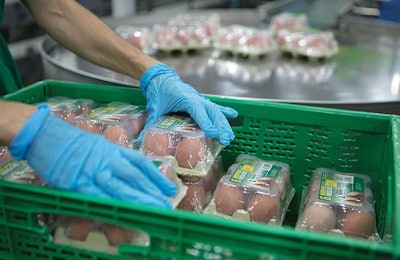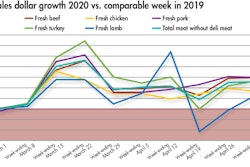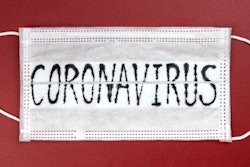
Grupo Huevos Guillén, a Valencia, Spain-based company that produces fresh eggs, quail eggs and egg products, has 6 million laying hens on 11 owned farms and 5 associated farms, where 500 professionals produce 161 million dozen eggs and 8 million kg of egg products. Huevos Guillén is the supplier of the Mercadona supermarket chain, the largest in Spain.
The value of the work performed by farmers, veterinarians, egg classification centers staff, quality control and drivers, among others, that continue working during the novel coronavirus (COVID-19) pandemic is essential. For this reason, Huevos Guillén is very grateful to all the staff for their great involvement, which has made it possible for the consumer to have eggs every day at the points of sale.
Given the situation generated by the pandemic, Huevos Guillén activated a contingency plan, to limit and minimize the impact on its activity, to be able to guarantee to maintain services with the highest quality standards and protect employees' health. Let's review some important points:
1. Feed management
In the case of feed delivery to farms, the usual cleaning and disinfection protocols have been reinforced. All precautions have been taken and clear instructions have been given to truck drivers to prevent contact with the plant and complex staff. Documentation of product delivery is done without direct contact.

Documentation of feed product delivery is done without direct contact at farms. (Courtesy Grupo Huevos Guillén)
2. Remote farm management
As a result of this unprecedented situation, Huevos Guillén restructured working routines. The technical and veterinary staff who regularly visit the farms and provide their services in terms of management, nutrition, health and animal welfare, have been established in one of the farms -- the most important -- to minimize visits to other farms.
Assistance to the other farms is done in two ways. The first is to work remotely with computer technology/apps. The second is through climate monitoring systems. Going to a farm is only done for cases of urgent needs for any serious health or pathological incident, and complete personal protective equipment is provided and contact with the personnel who work there is avoided.
The two farm shifts are staggered to avoid contact in the staff locker room. Thus, birds are cared for throughout the day, at different times.
Regarding biosecurity measures related to personnel entry to the premises, Huevos Guillén has maintained it and even increased it, despite the changes to workflow. Also, there is more supervision than normal in the use of disinfection arches, locker rooms and disposable clothing, among others.
Regarding outsourcing services that farms require, such as vaccination and loading equipment, the company has reinforced protocols for controlling people and their work clothes.
3. Special protocols in egg grading
At the operational level, in the egg grading units, the two separately established work shifts and the staggered access to common areas avoid direct contact between workers in and out and allows for additional cleaning with products, specifically virucides.

Two separately established work shifts and the staggered access to common areas avoid direct contact between workers at the operation level. (Courtesy Grupo Huevos Guillén)
External visits are prohibited, to avoid the presence of people outside of production. Likewise, work meetings are avoided as much as possible.
Huevos Guillén has a cleaning and disinfection plan approved by health authorities, suitable to fight against any biological risk in processes and in the product, as well as for employees.
In addition to the measures already discussed, a special protocol was established to reinforce disinfection within the egg grading units. Such protocol impacts all those areas susceptible to human contact, with the use of virucidal disinfectants. This reinforcement is carried out after daily cleaning and disinfection, during the shift change.
Similarly, Huevos Guillén has hygienic and disinfection measures to avoid biological risks in the process and product. In addition to routine hand washing, disinfection points have been installed with disinfecting gels, as specific measures aimed at personnel. Also, the company ensures the availability of specific disposable clothing/masks, overalls and gloves for all staff.
4. Reliable internal communication
Internal communication cannot be lacking. The company constantly conveys information to workers about what COVID-19 is, how it spreads and what are the measures to avoid infection, according to official information sources. This guarantees a safe workplace and a safe product.
5. Changes in logistics
The operators of the supermarket chain the company supplies go more frequently to warehouses to collect the product and take orders to logistics platforms with the utmost promptness for their daily distribution.
6. Automation: basic pillar
Process automation for Huevos Guillén is one of the basic pillars of its business strategy. For years, the company has implemented an automation plan with a manufacturing execution system (MES) in all its production centers, a computerized system that allows for real-time control of plant production and processes documentation.
Likewise, the company has implemented a lean manufacturing system, a model to minimize losses or waste in production. Through these tools, the key to differentiate itself within the egg market, the company makes a clear commitment, reinforced in these times of crisis.
7. Eggs in times of crisis
Eggs are an essential product of the basic shopping basket, to which the consumer turns, particularly in times of crisis. As a company in the primary sector, Huevos Guillén's production capacity is the same as before the crisis. In other words, with the 6 million layers the company continues to produce the same amount of dozen eggs, which cannot be increased in the short term.
At the beginning of the COVID-19 crisis, Spanish consumers stockpiled large quantities of basic products. Huevos Guillén responded to daily requests from the Mercadona supermarket chain throughout Spain, with the maximum production capacity available, to maintain supply.
Since then, the company has seen a slowdown in egg demand. In other words, consumers trust the product will be available to them in the supermarket, so they no longer need to buy more than necessary.
Due to the closure of hotels, restaurants and the catering sector, global egg demand is declining. Also, the unusual Easter week caused a decrease in sales typically associated with the holiday. All this means that, in general, egg-producing companies in Spain will see their sales decrease in the mid term.
8. The egg sector works at full steam
In Spain, the egg and egg products sector works these days to guarantee the supply of this staple. As INPROVO, the Spanish egg producers association, said: "Its 10,000 employees, spread over 1,416 farms, 880 packaging centers and 31 egg product industries, generally (small and medium-sized enterprises) located in rural areas throughout Spain, will bring fresh eggs daily to stores and egg products to food companies."
Egg producers are "the least visible face of a modern and efficient sector, one of the largest in the European Union by volume, which produced some 830,000 metric tons of eggs in 2019, enough for domestic consumption and to export 105,000 metric tons to countries around the world."
Consumers must be aware and know that, thanks to intensive production, the needs for safe and quality foods can be met, especially in these times of crisis and unique demand.


















